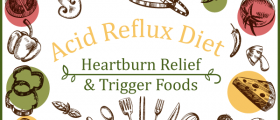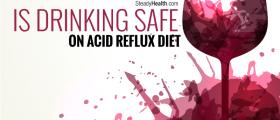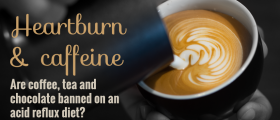
GERD
GERD (gastroesophageal reflux disease) is a condition when the acid from the stomach flows back into the esophagus. The acid irritates the lining of the esophagus. Occasional acid reflux does not cause any permanent damage and it can be treated at home, but if it is chronic and it occurs on daily bases, you should seek medical help. Pregnant women and people who smoke or who are overweight are more prone to GERD. Other factors which can trigger GERD include stress, excessive alcohol consumption, greasy fried food, spicy food, citrus fruits, garlic, onions, beverages which contain caffeine, and chocolate.Symptoms of GERD
The most common symptoms of GERD include heartburn, which is a burning sensation in the chest, swallowing difficulties, sore throat and a bad taste in the mouth. Other symptoms of GERD are pain in the chest, pain while swallowing, excessive production of saliva, hiccup, coughing and nausea. You may also have a feeling that you have a lump in your throat. People who have suffered from GERD for a long time may develop additional symptoms, such as hoarseness, persistent cough, teeth damage and breathing difficulties. If any of these symptoms are severe and persistent you should contact your doctor.Treatment for GERD
In mild or moderate cases of GERD, you can use some of the over-the-counter medications which will decrease or block the production of the stomach acid or repair irritated lining of the esophagus. If such medications do not make you feel better in a week or two, you should see your doctor. The doctor may prescribe medication or suggest a surgical procedure.Lifestyle
In case of severe GERD, you should make some lifestyle changes, in order to ease the symptoms or to prevent the acid from flowing back into the esophagus. If you are overweight, try to lose excess weight as soon as possible because it causes pressure on your stomach. You should not wear too tight clothes because it also puts pressure on the stomach. Avoid lying down right after a meal and keep the upper part of the body elevated while you sleep. You should also stop smoking.Diet
Avoid eating food which can irritate your stomach, such as spicy food, greasy food, chocolate, tomatoes, citrus fruits, onions, garlic, sour cream and ice cream. Also avoid coffee and alcohol. Food which should not cause any harm to your stomach include apples, bananas, baked potatoes, carrots, broccoli, peas, cabbage, low fat mild products and whole grains. You can also try some herbal remedies, especially chamomile, Marshmallow or licorice.
















Your thoughts on this
Loading...